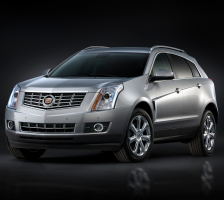— A Cadillac SRX headlight lawsuit has been dismissed after a GM owner claimed his SRX headlights were too dim to drive safely at night.
Virginia plaintiff Robert Elliott purchased a used 2016 Cadillac SRX with about 22,000 miles on the odometer, but the headlights began to go dim in January 2021.
Elliot says the SRX headlights kept getting worse until he wasn't able to drive at night unless he used the high beams only.
Doing that was dangerous because the high beams at night blinded oncoming drivers.
The plaintiff took the Cadillac for repairs in June 2021 and was told the headlight seals allowed moisture to damage the reflectors inside the headlights. The plaintiff had the Cadillac SRX headlights replaced at a cost of $1,600, but he says one of the headlights went dim just two months later.
According to the Cadillac SRX headlight lawsuit, the dim headlights are caused by water that accumulates and condenses in the headlight housing units because of the seals. Once this occurs, the igniters allegedly corrode which burns out the headlight bulbs.
Cadillac SRX owners allegedly overpaid for their vehicles due to the headlight problems, and the SUVs lose their value because of the headlights.
The SRX class action lawsuit also alleges GM has known about the SRX headlight problems since 2010 because of similar problems in 2010-2015 models. GM also issued technical service bulletins (TSBs) to dealerships regarding what to do if a customer complains.
But the plaintiff says the repairs don't help because dealers use the same defective headlight components as replacements.
General Motors also issued a customer satisfaction campaign for 2010 Cadillac SRX SUVs to reimburse owners for headlight repairs, and a SRX class action lawsuit was settled to reimburse 2010-2015 Cadillac SRX owners in California and Florida.
Cadillac SRX Headlight Lawsuit Dismissed
GM went to work dismantling the plaintiff's arguments by beginning with 2016 Cadillac SRX implied warranty claims. The automaker argued Virginia state law applies, which says, “[a]n action for breach of any contract for sale must be commenced within four years after the cause of action has accrued.”
According to GM, the implied warranty claim should be dismissed because the plaintiff purchased his Cadillac SRX in July 2016 and filed the class action lawsuit on October 29, 2021, well outside the four-year statute of limitations.
However, the plaintiff argued the statute of limitations should be ignored (tolled) because GM concealed the alleged defects from consumers, an argument Judge George C. Steeh didn't buy.
"Because Plaintiff has failed to allege sufficient facts to support equitable tolling of the statute of limitations under Virginia law, the court will dismiss his implied warranty claim as time barred." — Judge Steeh
Because the implied warranty claim was dismissed, the judge ruled the Magnuson-Moss Warranty Act also had to be dismissed.
In its motion to dismiss the SRX headlight lawsuit, GM said it didn't know about any alleged headlight problems before the plaintiff bought his SRX in 2016.
But the headlight class action lawsuit alleges customer complaints, internal testing by GM, the technical service bulletins and other actions prove GM knew about headlight failures.
In response, the judge ruled GM's alleged testing and data are only "conclusory" because the plaintiff made “no specific allegations about the results of the tests, such as data obtained by GM or documents confirming or suggesting whether the defect became known.”
As for GM having knowledge of an alleged headlight defect, the plaintiff argued the TSBs prove GM knew long ago.
However, the judge ruled none of the bulletins "specifically reference the Headlight Defect claimed by Plaintiff, which is that faulty seals and/or vent design allows moisture to accumulate in the headlamp assembly, resulting in corroded components and burnt-out or dimming bulbs."
In addition to the other dismissed claims, the judge also dismissed an unjust enrichment allegation and ruled the lawsuit was dismissed entirely because the plaintiff failed to state a claim.
The Cadillac SRX headlight lawsuit was filed in the U.S. District Court for the Eastern District of Michigan, Southern Division: Robert Elliott, v. General Motors LLC.
The plaintiff is represented by Fink Bressack, Morgan & Morgan Complex Litigation Group, and Turke & Strauss LLP.

